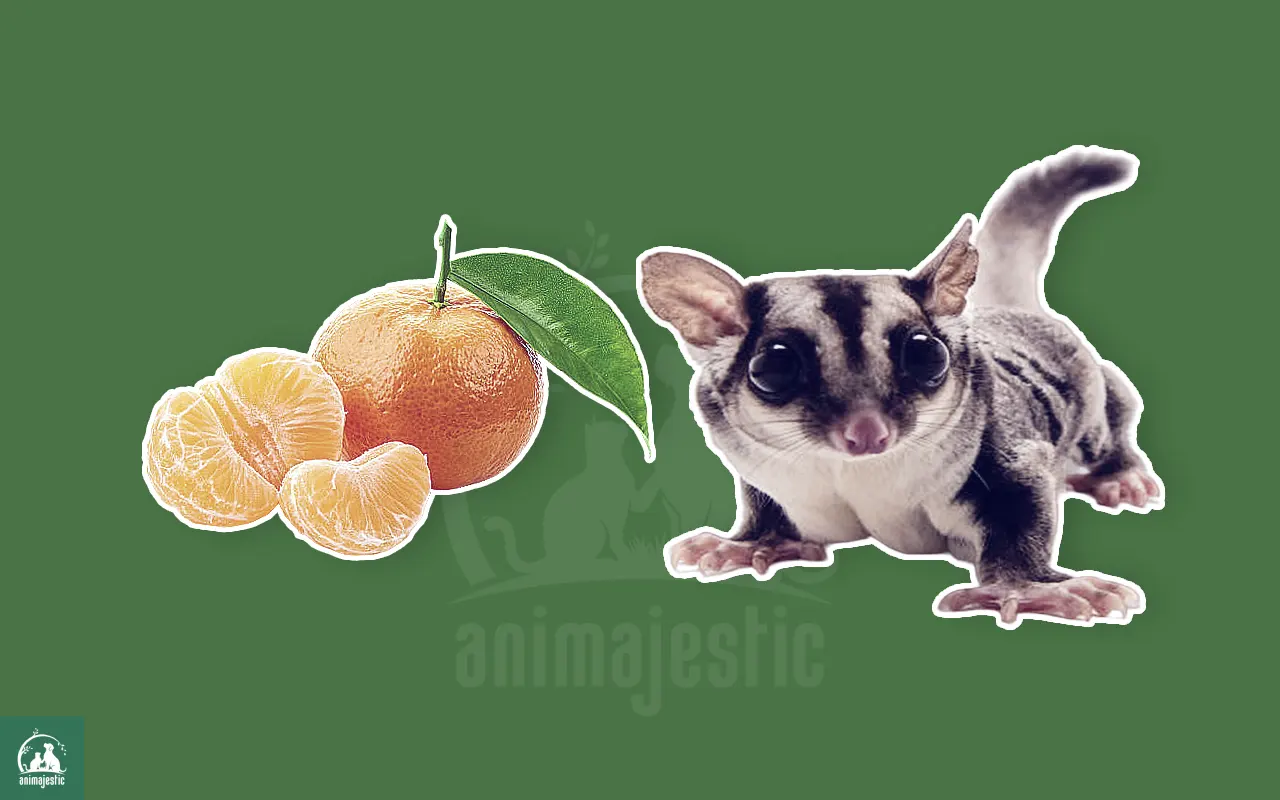Sugar gliders, enchanting marsupials with a penchant for variety in their diets, have a broad spectrum of feeding choices, given their omnivorous nature.
An intriguing query that bubbles up in the world of these tiny critters is, “Can sugar gliders eat mandarins?” However, just as with humans, some food options are more beneficial than others.
Let’s get on this topic, leaving you as an affirmed know-it-all on the issue by the end.
The Nutritional Profile of Mandarins
Before we decide whether sugar gliders should munch on mandarins, it’s crucial to understand what nutrition these citrusy globes bring to the table.
Mandarins, a relative of the orange family, are renowned for their impressive nutritional bouquet:
- Rich in vitamin C
- A good source of dietary fiber
- Brimming with bile acid-binding pectin
- Contains beta-carotene, lutein, and zeaxanthin antioxidants
Mandarins certainly hold promise in terms of nutritional value for us humans.
But do these factors apply equivalently to our flying marsupial friends, the sugar gliders? To assess that, we need to take a detailed look at the diet and nutrition needs of sugar gliders.
Understanding the Dietary Needs of Sugar Gliders
These nocturnal creatures have evolved to survive on an omnivorous diet that incorporates a broad array of foods:
- They relish insects and small invertebrates for protein.
- Their diet also includes sap and acacia gum for carbohydrates and fiber.
- They’re known to consume fruits and vegetables, which provide crucial vitamins and minerals.
Armed with the nutritional scoop on mandarins and having a sense of what fuels a sugar glider’s diet, it’s time we attempt to thread the two together and evaluate if mandarins could make a suitable feast for these marsupials.
Potential Benefits of Mandarins for Sugar Gliders
Mandarins spark joy not just with their bright color and juicy delight, but also their considerate health benefits.
Let’s explore together how these potential benefits might apply to sugar gliders:
- Vitamin C Powerhouse: Sugar gliders need their dose of Vitamin C for healthy skin, blood vessels, and overall well-being. Mandarins offer an excellent source of this essential nutrient.
- High Fiber Content: Mandarins carry a good amount of dietary fiber aiding in smooth digestion, which could be a plus for sugar gliders.
But it’s not all sunshine and mandarins; there are a few things we need to watch out for. Let’s shine some light on potential hazards that might stem from feeding mandarins to sugar gliders.
Potential Risks of Mandarins for Sugar Gliders
While there are potential benefits of feeding mandarins, there are also a few things to consider:
- Citrus Acid Content: Mandarins have a relatively high acid content, which could lead to potential digestive issues if consumed in excess.
- Sweet Treat: Sugar gliders, living up to their name, do have a sweet tooth, but too much sugar – even from fruit – can potentially lead to health issues such as obesity or diabetes.
- Not a Complete Dietary Substitute: Mandarins, nor any other fruit, should not replace a complete, balanced diet for sugar gliders.
So, it’s clear that feeding mandarins to sugar gliders isn’t as straightforward as it initially might have appeared. Thus, based on the collective knowledge we’ve gathered, let’s answer the original question.
But, Can Sugar Gliders Eat Mandarins?
The answer is a cautious “YES“, but with clear boundaries. Mandarins, while packed with wholesome nutrients, should be considered a treat and not a meal for sugar gliders.
Remember these basic guidelines when offering mandarins:
- Mandarins should always be served fresh and peeled. Seeds should be removed before these treats are given to your sugar glider.
- Start with small portions and observe your pet for any adverse reactions.
- They should be fed in moderation and should not replace their regular diet.
Treating mandarins as an occasional delight should keep your sugar glider’s diet balanced and varied without posing any substantial risks.
The Healthy Nutritional Mix for Sugar Gliders
While mandarins can become a fun part of your sugar glider’s diet, they should be given in conjunction with a range of other foods:
- Protein: This can be obtained from insects, lean meats, or specially prepared pellets for sugar gliders.
- Fruits and Vegetables: These provide valuable vitamins and minerals for your pet.
- Hydration: Fresh, clean water should always be accessible to your sugar glider to promote hydration and well-being.
Offering a varied diet and monitoring your sugar glider’s health and behavior closely is vital to ensure they have a long, happy, and healthy life.
Conclusion
It seems that our innocent inquiry – “Can sugar gliders eat mandarins?” isn’t as simple as it initially appeared. The answer is YES; they can, provided these citrusy orbs are given in moderation while ensuring the majority of their diet remains diverse and nutritionally rich.
Feeding a sugar glider is an adventurous journey, offering a wide range of meals from a rainbow of fruits to a variety of proteins. Mandarins could be a bright little pitstop on this exciting route, vividly satiating their palate once in a while.
As sugar glider guardians, it becomes our responsibility to monitor their diet and keep it as enriching and balanced as possible. Small steps towards their well-being can create giant leaps towards their health span.
So, dear sugar glider aficionados, next time you peel a fresh, ripe mandarin, remember to set a tiny portion aside for your petite friend.
And let’s reminisce on the joy of sharing some citrusy delight, while we continue on the path of providing the best possible care for these adorable creatures.
Here’s to a healthy and happy diet for our fuzzy companions!
